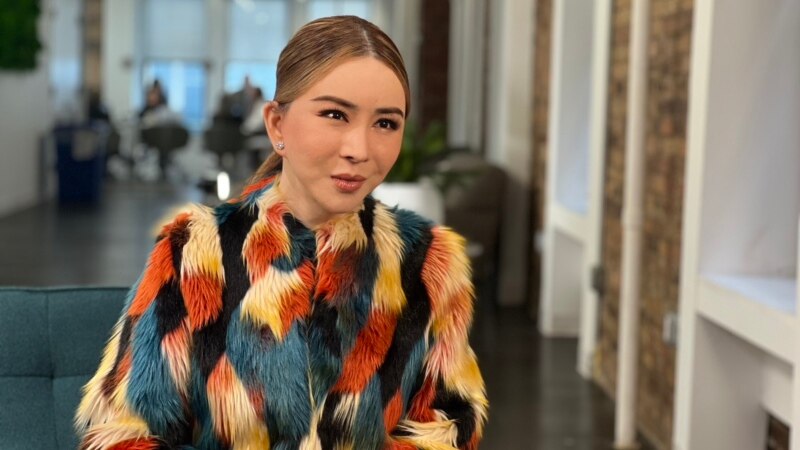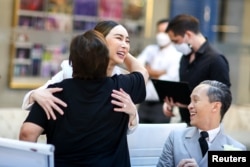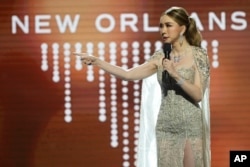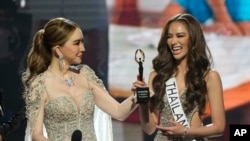This website uses cookies so that we can provide you with the best user experience possible. Cookie information is stored in your browser and performs functions such as recognising you when you return to our website and helping our team to understand which sections of the website you find most interesting and useful.
 New York —
New York —
"Helloooo! Hello the Universe! Whoo!" shouted Jakkaphong "Anne" Jakrajutatip, the latest owner of the Miss Universe contest, from a stage filled with beauty queens.
Jakkaphong, a Thai media tycoon and trans rights activist, bought the parent company, Miss Universe Organization (MUO), last year. She is the first non-American and first transgender woman to own the 7-decade-old pageant, which drew contestants to New Orleans from 83 countries last month.
The competition, launched in 1952, was once co-owned by former U.S. President Donald Trump, who bought it in in 1996 from ITT Corp., then sold it in 2015 to WME/IMG, a talent agency and entertainment company, according to Variety.
In October, Jakkaphong expanded her business, JKN Global Group, headquartered in Samut Prakan, Thailand, by taking over the MUO offices in New York City when she bought the Miss Universe, Miss USA and Miss Teen USA pageants for $20 million.
She's cut a $12.2 million deal with organizers in El Salvador, which will host the Miss Universe competition in 2023 for the first time since 1975.
Jakkaphong saw the Miss Universe platform as a promising asset, one that will help her fulfill her goal of empowering women and promoting feminism by encouraging all women — transgender, married, pregnant, divorced — to enter the contest.
"I was born as a trans woman," Jakkaphong told VOA's Thai Service during an exclusive interview in New York last month.
"My life purpose here is to help other people to transform, to lead, to teach and to inspire people," said the 43-year-old businesswoman educated in Australia who is a celebrity in Thailand. "I need to become the inspiration for a lot of people [like] 'you don't give up no matter what and nobody can bring you down once they see you are good.' "
Describing herself as having been born "without a golden spoon in my mouth," Jakkaphong comes from a Thai Chinese upper-middle class family that ran a video rental store, which she inherited before starting her own foreign TV content import business. She founded JKN Global Group in 2013.
Jakkaphong advocates for transgender rights in Thailand through her Life Inspired for Thailand Foundation. Since 2019, the group has campaigned for a draft bill to address transgender rights, including recognizing legal gender title change for people who go through gender reassignment operations. The draft needs more signatures to move forward to the Thai parliament.
Although considered one of the most LGBTQ+ friendly Asian countries, Thailand's laws do not grant equal rights to members of the LGBTQ+ community in title change and marriage.
Jakkaphong believes the Miss Universe pageant comes with enough influence that it may be able to help change the laws in Thailand and other countries that do not yet provide equal rights to LGBTQ+ people.
"I believe that politicians wishing to run as countries' leaders will raise this [gender title change] issue and will make it happen for us… MUO is the platform that helps urge countries to look at this matter," she said, adding that she will soon raise the issue with Thai Prime Minister Prayuth Chan-ocha.
"The [Thai] government is occupied with so many things, and of course, we don't even know [whether] we will have the same government or not. We will have the election coming up," in May, said Jakkaphong. "But [gender title change] has to happen one day."
Despite her belief that the pageant is a force for change, Jakkaphong said there's no talk of politics on stage. "We talk about inspiration. We talk about the power of feminism and that is more important," she said.
While Jakkaphong acknowledges that "many countries on the stage don't get along with each other," the contest is "about a dream of one woman. You cannot stop her dream no matter where she comes from. We cannot block anybody's dreams, particularly young women's."
She sees those dreams as countering the notion that pageants impose rigid standards of beauty on contestants, standards that exclude rather than include, and objectify women.
Some 2.4 million people watched the Miss Universe 2022 final competition on January 14 on the U.S.-based, Spanish-language Telemundo network, according to ustvdb.com. This was the first year the streaming service Roku Channel broadcast the contest. It has yet to disclose viewing numbers.
Nielsen, the company that rates the popularity of American television shows, reported 2.7 million people watched the 2021 competition, a drop from 2019 when 3.8 million people watched the competition. In 2014, the last year of Trump's involvement, 8.8 million people watched the contest, according to Nielsen.
On the final day of competition, January 14, Jakkaphong said, "We can elevate our women to feel strong enough, good enough, qualified enough, and never be objectified again," before presenting the Transformational Leadership award to Thai entrant Anna Sueangam-iam, whose family collects garbage for recycling.
In New York Jakkaphong told VOA’s Thai Service that promoting inclusivity while recognizing beauty lets audiences "see the diversity… But the brain and the beauty must come together."
Miss USA, R'Bonney Gabriel, who on January 14 won the first Miss Universe competition under Jakkaphong's regime, is a fashion entrepreneur who designs a line of sustainable clothing.
Becoming an inspiration for others is central to the role of beauty queens, said Jakkaphong, adding that the Miss Universe pageant helps promote the message of "becoming the best version of oneself" and "becoming so beautifully confident that you would love to lift up the spirit of other human beings."
Jakkaphong said the pageant under her ownership will continue to be different from its predecessors.
"This is the new paradigm of the beauty competition, which I don't see as the beauty competition alone. It's actually a female platform to raise awareness. Therefore, the whole world can listen to them."



 Africana55 Radio
Africana55 Radio 



